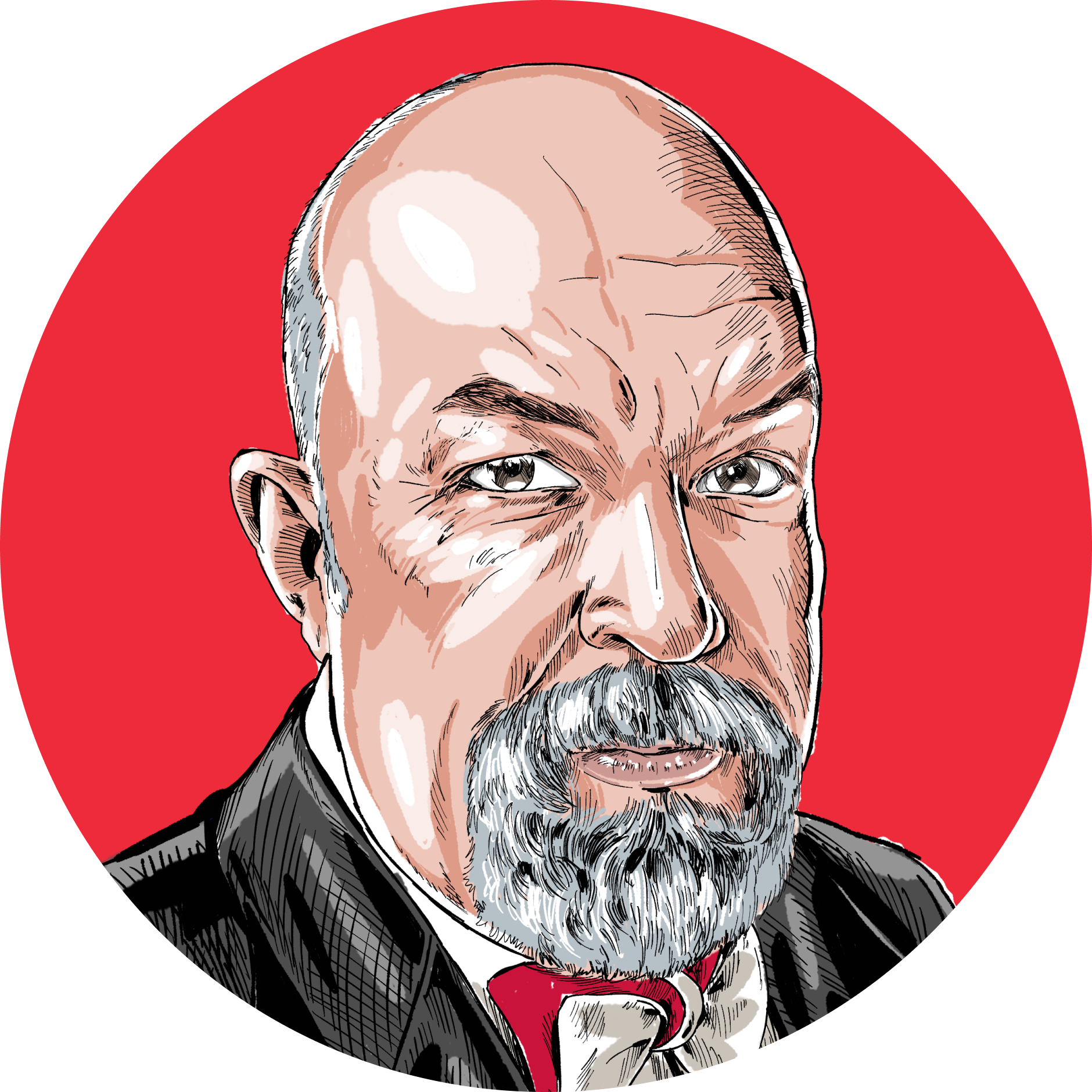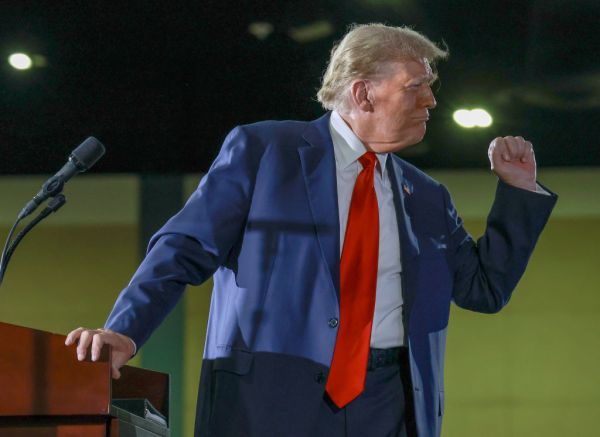If you have ever spent any time around one of the more demonstrative forms of Christianity, you may have noticed that it is very, very rare for someone to walk up the aisle and tearfully prostrate himself before the altar because his life is going so well. It’s the desperate times of life that more reliably bring us to our knees (or all the way down). Because politics has to a shocking extent supplanted the role of religion in American life—including in many institutions that think of themselves as Christian churches—one can see the same phenomenon at work in the political realm. Ecstatic politics requires a crisis; gratitude is not a powerful enough emotion—what is required is terror, or at least its 2 percent, half-caff version, anxiety.
That is why we are engaged in all this preposterous talk about how poorly the U.S. economy is doing when the opposite is the case: The U.S. economy is a remarkable, stupendous, world-beating success story. We should take a second to appreciate that fact and how it came to be.
Do you remember 1995? That was a pretty good year. The economy was growing, and the rate of growth was increasing. The post-Cold War dividend was starting to really kick in, the Internet was starting to take off (Netscape Navigator had been introduced in 1994), and market returns were just bananas. Starting from the closing weeks of 1994, the DJIA, the S&P 500, and the Russell 1000 nearly tripled over the next five years, while the NASDAQ grew almost 500 percent in five years. The U.S. economy was such a powerhouse that U.S. GDP accounted for almost a quarter of the economic output of the human race, about 24 percent.
Today, after the rise of China as a global economic power, after the financial crisis of 2007-08, the Great Recession, and all that, U.S. GDP as a share of world economic output has fallen all the way to … the same 24 percent, as it turns out. In fact, that current share is up a bit over recent years: As recently as 2011, it was only 21 percent.
The U.S. leads the world in economic output because U.S. workers are by far the most productive of any major economy. An hour of work by the typical U.S. worker produces more than five times as much economic value as an hour of labor by a Chinese worker, which is no surprise, given the more sophisticated character of the U.S. economy. But U.S. workers also beat out their European, Japanese, British, Canadian, and Australian counterparts for every hour they work—and they generally put in more hours, too. In 2021, U.S. productivity growth was 60 percent faster than in Germany, faster than Australia, Canada, Denmark, New Zealand, Switzerland, or the United Kingdom—Israel kept up, and the Netherlands and Ireland edged the United States out a bit. (Sure, you can complain about corporate tax havens—or you can get smart and be the tax haven.) The United States even has dealt with post-COVID inflation better than our European cousins.
If you want the good news about the U.S. economy, read the foreign press. The Economist gets it:
On a whole range of measures American dominance remains striking. And relative to its rich-world peers its lead is increasing. . . . More astonishing, and less appreciated, than its ability to hold its place in the world as a whole is the extent to which America has extended its dominance over its developed peers. In 1990 America accounted for 40% of the nominal gdp of the g7, a group of the world’s seven biggest advanced economies, including Japan and Germany. Today it accounts for 58%. In PPP terms the increase was smaller, but still significant: from 43% of the g7‘s gdp in 1990 to 51% now (see chart 2). So much for a declining power.
America’s outperformance has translated into wealth for its people. Income per person in America was 24% higher than in western Europe in 1990 in PPP terms; today it is about 30% higher. It was 17% higher than in Japan in 1990; today it is 54% higher. In PPP terms the only countries with higher per-person income figures are small petrostates like Qatar and financial hubs such as Luxembourg. A lot of that income growth was at the top end of the scale; the ultra rich have indeed done ultra well. But most other Americans have done pretty well, too. Median wages have grown almost as much as mean wages. A trucker in Oklahoma can earn more than a doctor in Portugal. The consumption gap is even starker. Britons, some of Europe’s best-off inhabitants, spent 80% as much as Americans in 1990. By 2021 that was down to 69%.
There are three countries in the world with a higher mean income than the United States: Luxembourg, the United Arab Emirates, and Switzerland. If you want to talk about median income, then you can add in Norway. There is much to like about Switzerland and Norway, and good things you could say about UAE and Luxembourg, too, but those four countries together have about the population of Florida and some highly unusual economic circumstances—unusual, but, if you think about it, not entirely out of reach of the United States, either. We have banks, corporate headquarters, and oodles of oil here, too. From that point of view, we are outperforming the world but underperforming our actual economic potential.
Another thing we have a lot of: ready capital. A bit more from The Economist:
America also has far and away the world’s deepest and most liquid financial markets, providing efficient, if occasionally unstable, channels for financing businesses and sorting the winners from the losers. Stockmarket capitalisation runs to about 170% of gdp; in most other countries it comes in below 100%. Funding for potentially high-growth startups is particularly bountiful: about half of the world’s venture capital goes to firms in America.
You don’t have to love the Wall Street guys, but you should try to understand what it is they do and how that helps make the rest of us richer. If you want to build a factory, what are you going to do? Save your nickels? Have a bake sale? No, you are going to get the money from the money factory. It’s nice to have one of those in our backyard. Sneer at the finance bros all you like; you’d miss them if they weren’t there. You don’t have to thank them—they get paid just fine. It’s a nice little arrangement that doesn’t press everybody’s happy cultural buttons or scratch everybody’s social-justice itch—but it works. And surely the fact that it works should count for something. Maybe give some thought to that before deciding to burn it all down in favor of an economy based on your favorite superstition, whether green energy, “economic patriotism,” or whatever flavor of horsepucky your favorite populist demagogue is selling this week.
The United States should be the most conservative country in the world, and our main domestic political priority could be summarized in just five words: “Do not f*** this up.”
Instead, we have runaway jackwagons and grifters, left and right, talking about the need for “revolution” or, if not that, “building a new economy,” “fundamentally transforming” the country, labor market, the financial sector, the energy industry, this, that, and the other. Imagine that: national prosperity created by generations of entrepreneurs, inventors, investors, and workers, fundamentally transformed into … something … by a bunch of middling lawyers and reality-television grotesques who couldn’t change a flat tire if their lives depended on it.
No, it isn’t a perfect world—nobody says it is, and nobody over the age of 8 thinks you have any reasonable expectation of living in such a world. But when Phil Gramm said the United States is a “nation of whiners,” he was, if anything, being too gentle. We aren’t just a nation of whiners—we are, at least in the worst of our political discourse, a nation of ingrates. And more often than not, ignorant ingrates at that, the spoiled adolescents of human history who literally don’t know how good we have it.
We have problems. Prosperity gives us choices about how we deal with them, resources to deploy, and a cushion to help us over the rough patches. Good intentions are fine, but good intentions and a $27 trillion economy will get you a lot farther than good intentions alone.









Please note that we at The Dispatch hold ourselves, our work, and our commenters to a higher standard than other places on the internet. We welcome comments that foster genuine debate or discussion—including comments critical of us or our work—but responses that include ad hominem attacks on fellow Dispatch members or are intended to stoke fear and anger may be moderated.